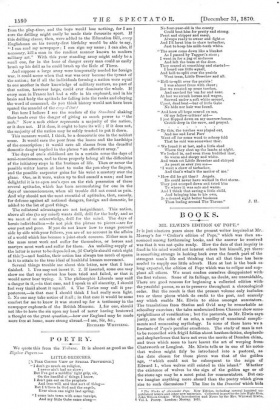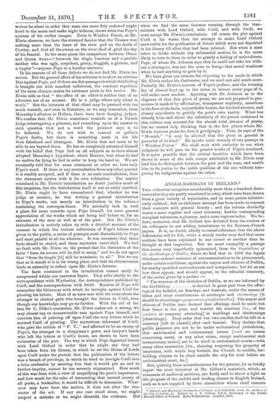BOOKS.
MR. ELWIN'S EDITION OF POPE.*
IT is just nineteen years since the present writer inquired at Mr.- Murray's for " Croker's edition of Pope," which was then an- nounced among forthcoming books, and the answer he received was that it was not quite ready. How the date of that inquiry is- fixed in his mind would not interest others but himself, yet there. is something strange in looking back over the fourth part of the strongest man's life and thinking that all that time has been needed to supply one little adverb. Here at last is the book so long expected, the edition of Pope which was to eclipse and sup- plant all others. AVe must confess ourselves disappointed with. the first volume. Some of its failings, no doubt, are unavoidable,. There are good reasons for beginning a collected edition with, the youthful poems, so as to preserve throughout a chronological) order. But the result is that the present volume only includes- two or three pieces which do credit to the poet, and scarcely, any which enable Mr. Elwin to shine amongst annotators._ The translations from Statius and Ovid may be remarkable as- schoolboy exercises; the tales modernized from Chaucer show some sprightliness of versification ; but the pastorals, as Mr. Elwin says, justly, are the echo of an echo, a medley of unnatural compli-- meats and unmeaning mythology. In none of these have we a foretaste of Pope's peculiar excellence. The study of man is not to be reconciled with frigid follies about heathen deities, shepherds‘ and shepherdesses that have not even the merits of Dresden china,. and trees which seem to have learnt the art of weeping from. Chatsworth or Longleat. Mr. Elwin tells us in one of his notes- that wolves might fitly be introduced into a pastoral, as the date chosen for those pieces was that of the golden age, "which could not be subsequent to the reign of Edward I., when wolves still existed in this island." Whether' the existence of wolves be the sign of the golden age or of the stone age may be a moot point for commentators. But can. we imagine anything more absurd than the poetry which gives rise to such discussions ? The line in the Dunaiad which bids * The Works of Alexander Pope. New edition, including several hundred un- published letters and other new materials. Collected in put by the late Right RM. John Wilson Conker. With Introduction and Notes by the Rev. Whitwall Vol. I. Poetry. London: Murray. 1871.
wolves be silent in order that some one more fitly endowed might howl to the moon and make night hideous, shows what was Pope's opinion of his earlier images. Even in Windsor Forest, as Mr. Elwin observes, we have the strained fancies that the Thames was nothing more than the tears of the river god on the death of Cowley, and that all the swans on the river died of grief the day of his funeral. In the same poem the comparison between Diana and Queen Anne.--" between the virgin huntress and a prolific mother who was ugly, corpulent, gouty, sluggish, a glutton, and a tippler "—exposes Pope to a harsher sentence.
In his censure of all these defects we do not find Mr. Elwin too severe. But the general effect of his criticism is to show an extreme bias against Pope, and if there are few passages in which this feeling is brought out with manifest unfairness, the constant repetition of the same charges makes its existence plain to the reader. Mr. Elwin tells us that "the office of an editor is neither that of an advocate nor of an accuser. He is a judge whose only client is truth." But the interests of that client may be pursued with too much warmth, and even in literature, as we may remember, from Macaulay's allusion to Hallam, there have been hanging judges. We confess that Mr. Elwin sometimes reminds us of a French judge interrogating a prisoner, and remarking upon the answer to each question that not a word the prisoner says is to be believed. We do not wish to conceal or palliate Pope's faults, but there is something more in his life than falsehood and stratagem. Mr. Elwin does not seem to be able to see beyond them. He has so completely saturated himself with the belief that Pope lied on all subjects as to have almost adopted Macaulay's hypothesis about Barrere, that when he had no motive for lying he lied in order to keep his hand in. We are constantly told that for some statement or other we have only Pope's word. If there is any contradiction from any other quarter it is readily accepted, and if there is no such contradiction, then the statement carries with it its own refutation. The matter contained in Mr. Elwin's introduction no doubt justifies much of this suspicion, but the introduction itself is not so easily justified. Mr. Elwin ought to have remembered that, whether he was judge or accuser, he was writing a general introduction to Pope's works, not merely an introduction to the volumes containing the correspon dence. We naturally look in such a place for some remarks upon Pope himself, for some general appreciation of the works which are being laid before us, for an estimate of the man as well as of the poet. But Mr. Elwin's introduction is entirely taken up with a detailed account of the manner in which the various collections of Pope's letters were given to the public, a series of passages most discreditable to Pope and most painful to all his admirers. It was necessary that these facts should be stated, and these mysteries unravelled. We find no fault with Mr. Elwin on the ground that his discussion of the facts "from its nature will be dull to many," and we do not agree that "from its length [it] will be wearisome to all." But we say that as it stands it is in its wrong place, and that its obtrusiveness leads us naturally to reflect upon Mr. Elwin's fairness.
The facts contained in the introduction cannot easily be compressed within our narrower limits. They refer chiefly to the correspondence with Wycherley, the correspondence published by Curl), and the correspondence with Swift. Readers of Pope will remember the bitterness with which he inveighs against Curll for pirating his letters. Most of us have met with the story about the stranger in clerical garb who brought the letters to Curl!, even though our knowledge may go no further. With the aid of the late Sir C. Dilke's researches, Mr. Elwin makes out a strong, we may almost say an unanswerable case against Pope himself, and convicts him of palming off upon Curll the very letters which he accused Curll of pirating. The mysterious informant of Curl], who gave the initials of "P. T.," and affected to be an enemy of Pope's, the stranger in a clergyman's gown and lawyer's bands -who left the letters at Curll's house, are shown to have been emissaries of the poet. The way in which Pope deposited letters with Lord Oxford in order that he might say they had been taken from his library, in which he set the House of Lords upon Curll uncler the pretext that the publication of the letters was a breach of privilege, in which he tried to inveigle Curll into a false confession by assuring him that it would put an end to further inquiry, cannot be too severely stigmatized. How much of this was done with a view of magnifying the poet's importance, and how much for the sake of tormenting that natural enemy of all poets, a bookseller, it would be difficult to determine. What- ever may have been the motive, it does not alter the cha- racter of the act. If any one case stood alone, we might suspect a mistake or we might discredit the evidence. But when we find the same features running through the tran- sactions with Lord Oxford, with Curl], and with Swift, we must accept Mr. Elwin's conclusions. Of course the plot againab Curll is far worse than the attempt to make Lord Oxford, answerable for the publication of letters which were not deposited in his library till after they had been printed. But when a man takes to tricks without any substantial motive, he is the more likely to turn to them in order to gratify a feeling of malevolence. Pope, of whom Dr. Johnson says that he could not take tea with- out a stratagem, was not the man to forego that moral weakness. when he had anything to gain by it.
We have given our reasons for objecting to the mode in which Mr. Elwin makes his disclosures, and we need not add much more. Probably Mr. Elwin's censure of Pope's preface, and the running fire of dissent kept up in the notes to almost every page of it,. will strike most readers. Agreeing with Dr. Johnson as to the elegance of that fine piece of prose, we are not prepared to pro- nounce it marked by affectation, transparent sophistry, assertions. in the face of the facts, unjustifiable boasts, far-fetched excuses, and clumsy expedients to gratify the poet's own vanity. What has already been said about the inferiority of the poems contained in this volume may account for the almost total absence of praise,. but we cannot help thinking that in the few places where Mr. Elwin bestows praise he does it grudgingly. Thus, he says of the "Messiah," "it may be allowed that the piece in general is powerful of its kind." He speaks more warmly of one passage in "Windsor Forest." We shall wait with curiosity to see what judgment he will pass on the greater works of Pope's manhood. It is quite possible that the critical faculties which have been shown in some of the able essays attributed to Mr. Elwin may lead him to distinguish between the poet and the man, and enable him to do justice to the noble qualities of the one without tem- pering his indignation against the other.



































 Previous page
Previous page